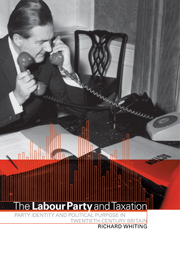Book contents
- Frontmatter
- Contents
- List of tables
- Acknowledgements
- List of abbreviations
- Introduction: Taxation and political debate
- 1 Struggles within a liberal inheritance, 1906–1940
- 2 The changing balance of tax interests, 1940–1954
- 3 The Kaldor era, 1951–1965
- 4 Social democracy examined, 1965–1970
- 5 Defensive positions, 1970–1979
- 6 Epilogue: New Labour, old problems?
- 7 Conclusion
- Select bibliography
- Index
1 - Struggles within a liberal inheritance, 1906–1940
Published online by Cambridge University Press: 07 August 2009
- Frontmatter
- Contents
- List of tables
- Acknowledgements
- List of abbreviations
- Introduction: Taxation and political debate
- 1 Struggles within a liberal inheritance, 1906–1940
- 2 The changing balance of tax interests, 1940–1954
- 3 The Kaldor era, 1951–1965
- 4 Social democracy examined, 1965–1970
- 5 Defensive positions, 1970–1979
- 6 Epilogue: New Labour, old problems?
- 7 Conclusion
- Select bibliography
- Index
Summary
Although Labour only held office for two short periods down to 1931 its experience goes to the heart of the key themes of this book about the role of a party within the area of taxation. In particular, it explores the question of how far Labour was able to establish its legitimacy as a reforming party within two contexts for tax politics. One of these was presenting tax ideas to the people, where reforms had to be defended against popular instincts and prejudices, especially at election time. The other was arguing a case within the political institutions of the democracy, in royal commissions and in parliamentary committees, for example, which had a wholly different, and rather more academic, favour than the popular domain. This period therefore establishes some early truths about the nature of tax politics and Labour's involvement in it.
Labour faced these demanding tests in what were two strongly contrasting periods. Before 1914 it had to establish itself within the Liberals' programme of reform and it had to make sure it was not a mere spectator of this reforming energy. After 1918 it had to adapt that inheritance to the much less promising conditions of the 1920s. Reform was no longer carrying all before it and the Conservatives were able to use an anti-socialist appeal which fed off the anxieties towards the modern tax state developed by the war.
- Type
- Chapter
- Information
- The Labour Party and TaxationParty Identity and Political Purpose in Twentieth-Century Britain, pp. 8 - 60Publisher: Cambridge University PressPrint publication year: 2001



